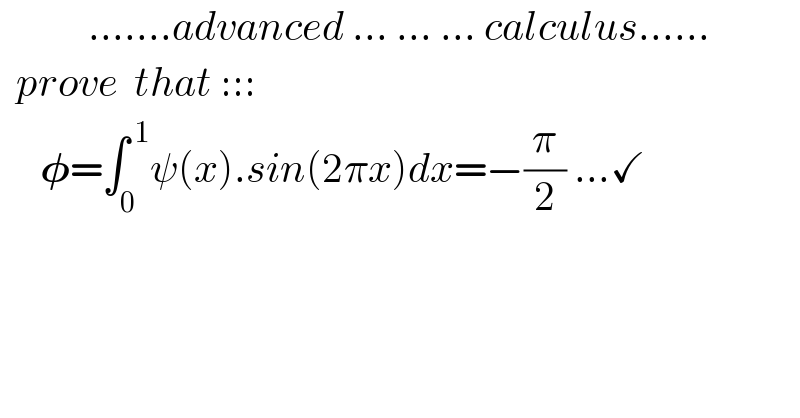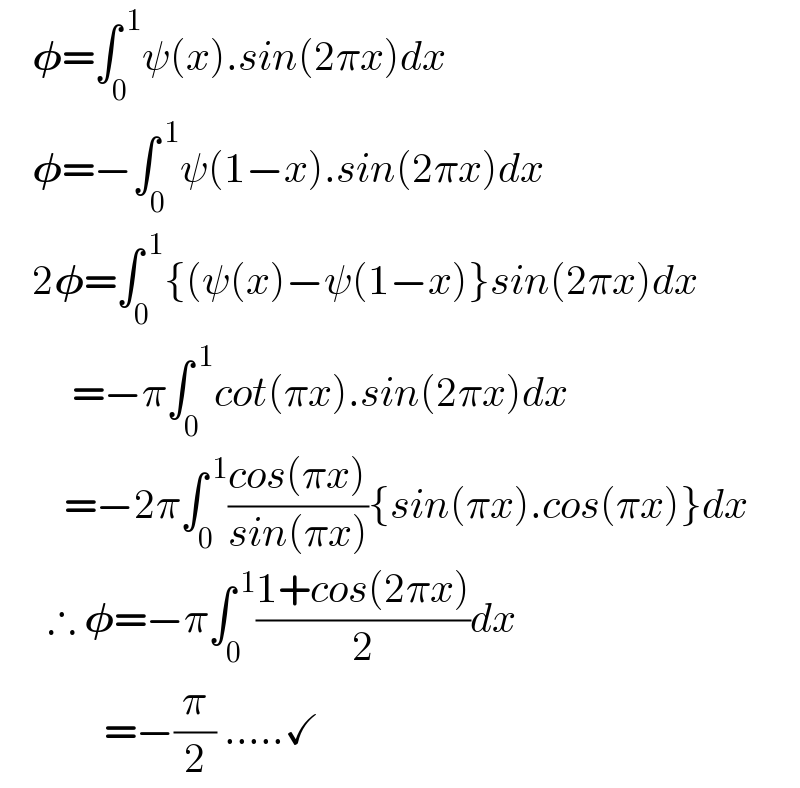
Question Number 138041 by mnjuly1970 last updated on 09/Apr/21

$$\:\:\:\:\:\:\:\:\:\:\:.......{advanced}\:...\:...\:...\:{calculus}...... \\ $$$$\:\:{prove}\:\:{that}\:::: \\ $$$$\:\:\:\:\:\boldsymbol{\phi}=\int_{\mathrm{0}} ^{\:\mathrm{1}} \psi\left({x}\right).{sin}\left(\mathrm{2}\pi{x}\right){dx}=−\frac{\pi}{\mathrm{2}}\:...\checkmark \\ $$$$ \\ $$
Answered by Dwaipayan Shikari last updated on 09/Apr/21
![∫_0 ^1 ψ(x)sin(2πx)dx =[sin(2πx)log(Γ(x))]_0 ^1 −2π∫_0 ^1 log(Γ(x))cos(2πx) =−π∫_0 ^1 log(π)cos(2πx)+π∫_0 ^1 log(sin(πx))cos(2πx)dx =∫_0 ^π log(sin(u))cos(2u)du =[(1/2)log(sin(u))sin(2u)]_0 ^π −(1/2)∫_0 ^π ((sin(2u)cos(u))/(sin(u)))du =−(1/2)∫_0 ^π 1+cos(2u)du=−(π/2)](Q138052.png)
$$\int_{\mathrm{0}} ^{\mathrm{1}} \psi\left({x}\right){sin}\left(\mathrm{2}\pi{x}\right){dx} \\ $$$$=\left[{sin}\left(\mathrm{2}\pi{x}\right){log}\left(\Gamma\left({x}\right)\right)\right]_{\mathrm{0}} ^{\mathrm{1}} −\mathrm{2}\pi\int_{\mathrm{0}} ^{\mathrm{1}} {log}\left(\Gamma\left({x}\right)\right){cos}\left(\mathrm{2}\pi{x}\right) \\ $$$$=−\pi\int_{\mathrm{0}} ^{\mathrm{1}} {log}\left(\pi\right){cos}\left(\mathrm{2}\pi{x}\right)+\pi\int_{\mathrm{0}} ^{\mathrm{1}} {log}\left({sin}\left(\pi{x}\right)\right){cos}\left(\mathrm{2}\pi{x}\right){dx} \\ $$$$=\int_{\mathrm{0}} ^{\pi} {log}\left({sin}\left({u}\right)\right){cos}\left(\mathrm{2}{u}\right){du} \\ $$$$=\left[\frac{\mathrm{1}}{\mathrm{2}}{log}\left({sin}\left({u}\right)\right){sin}\left(\mathrm{2}{u}\right)\right]_{\mathrm{0}} ^{\pi} −\frac{\mathrm{1}}{\mathrm{2}}\int_{\mathrm{0}} ^{\pi} \frac{{sin}\left(\mathrm{2}{u}\right){cos}\left({u}\right)}{{sin}\left({u}\right)}{du} \\ $$$$=−\frac{\mathrm{1}}{\mathrm{2}}\int_{\mathrm{0}} ^{\pi} \mathrm{1}+{cos}\left(\mathrm{2}{u}\right){du}=−\frac{\pi}{\mathrm{2}} \\ $$
Commented by mnjuly1970 last updated on 09/Apr/21

$${verynice}\:{mr}\: \\ $$$${payan}..\:{thank}\:{you}\:{so}\:{much}.. \\ $$
Answered by mnjuly1970 last updated on 09/Apr/21

$$\:\:\:\:\boldsymbol{\phi}=\int_{\mathrm{0}} ^{\:\mathrm{1}} \psi\left({x}\right).{sin}\left(\mathrm{2}\pi{x}\right){dx} \\ $$$$\:\:\:\:\boldsymbol{\phi}=−\int_{\mathrm{0}} ^{\:\mathrm{1}} \psi\left(\mathrm{1}−{x}\right).{sin}\left(\mathrm{2}\pi{x}\right){dx} \\ $$$$\:\:\:\:\mathrm{2}\boldsymbol{\phi}=\int_{\mathrm{0}} ^{\:\mathrm{1}} \left\{\left(\psi\left({x}\right)−\psi\left(\mathrm{1}−{x}\right)\right\}{sin}\left(\mathrm{2}\pi{x}\right){dx}\right. \\ $$$$\:\:\:\:\:\:\:\:\:=−\pi\int_{\mathrm{0}} ^{\:\mathrm{1}} {cot}\left(\pi{x}\right).{sin}\left(\mathrm{2}\pi{x}\right){dx} \\ $$$$\:\:\:\:\:\:\:\:=−\mathrm{2}\pi\int_{\mathrm{0}} ^{\:\mathrm{1}} \frac{{cos}\left(\pi{x}\right)}{{sin}\left(\pi{x}\right)}\left\{{sin}\left(\pi{x}\right).{cos}\left(\pi{x}\right)\right\}{dx} \\ $$$$\:\:\:\:\:\:\therefore\:\boldsymbol{\phi}=−\pi\int_{\mathrm{0}} ^{\:\mathrm{1}} \frac{\mathrm{1}+{cos}\left(\mathrm{2}\pi{x}\right)}{\mathrm{2}}{dx} \\ $$$$\:\:\:\:\:\:\:\:\:\:\:\:\:=−\frac{\pi}{\mathrm{2}}\:.....\checkmark \\ $$
